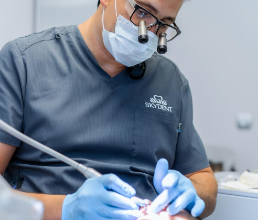Finding an Emergency Dentist in Burlington: Your Guide to Quick Relief

Understanding Dental Emergencies
Dental emergencies can be scary, but knowing what to look for can make a big difference. It’s important to understand what constitutes a real emergency so you can get the care you need quickly. Sometimes, it’s obvious – like a knocked-out tooth. Other times, it might be less clear. For example, needing a wisdom teeth extraction burlington might not feel like an emergency at first, but if it’s causing severe pain or infection, it definitely is.
Types of Dental Emergencies
Dental emergencies come in different forms. Here are a few examples:
- Knocked-out tooth: This requires immediate attention to try and save the tooth.
- Severe toothache: If the pain is unbearable and doesn’t respond to over-the-counter pain relievers, it’s an emergency.
- Broken or cracked tooth: Depending on the severity, this can lead to infection or further damage if not treated promptly.
- Abscess: A painful infection around a tooth or in the gums that needs immediate treatment to prevent it from spreading.
Signs You Need Immediate Care
How do you know if you need to rush to an emergency dentist? Here are some signs:
- Uncontrolled bleeding: Bleeding that doesn’t stop after applying pressure for a reasonable amount of time.
- Severe pain: Pain that is so intense it interferes with your ability to function.
- Swelling: Significant swelling in your mouth or face, which could indicate a serious infection.
- Difficulty breathing or swallowing: This could be a sign of a severe infection that needs immediate medical attention.
Common Causes of Dental Emergencies
So, what causes these dental emergencies in the first place? Here are some common culprits:
- Trauma: Accidents, falls, or sports injuries can lead to knocked-out, broken, or dislodged teeth.
- Decay: Untreated cavities can lead to severe toothaches, infections, and abscesses.
- Gum disease: Advanced gum disease can cause teeth to loosen and eventually fall out.
- Failed dental work: Fillings, crowns, or other dental restorations can sometimes fail, leading to pain or infection.
Finding the Right Emergency Dentist
Okay, so you’ve realized you need an emergency dentist in Burlington, and fast. But how do you actually find a good one? It’s not like you can just pick the first name you see. Here’s what I’d do:
Researching Local Options
First, start with a quick online search. Don’t just look for “dentist near me”; be specific. “Emergency dentist Burlington open now” will give you more relevant results. Check out a few different clinics and see what their websites say. Do they specifically mention emergency services? Do they list the types of emergencies they handle? Also, ask around! Word of mouth is still super useful. See if your friends, family, or coworkers have any recommendations. Personal experiences can be really insightful.
Checking Availability and Hours
This is huge. An emergency dentist that’s closed isn’t going to help you much. Make sure they have hours that work for you, especially if it’s after hours or on a weekend. Some dentists have 24/7 emergency lines, which is ideal. Call the office to confirm their availability before you head over. It’s better to be safe than sorry and waste a trip. Also, ask about their typical wait times for emergency appointments. You don’t want to be stuck in the waiting room for hours when you’re in pain.
Reading Patient Reviews
Online reviews can be a goldmine of information. Check out Google, Yelp, and Healthgrades to see what other patients are saying. Look for patterns. Are people consistently praising the dentist’s bedside manner? Are there a lot of complaints about long wait times or high prices? Take the reviews with a grain of salt, of course, but they can give you a good overall impression of the dentist’s practice. Pay attention to reviews that mention emergency services specifically. Those will be the most relevant to your situation.
What to Expect During an Emergency Visit
So, you’ve got a dental emergency and you’re heading to the dentist. What happens next? It’s natural to feel a little anxious, but knowing what to expect can really help ease your mind. The goal of any emergency dental visit is to address the immediate problem, relieve your pain, and prevent further complications. Here’s a breakdown of what usually goes down during an emergency dental visit.
Initial Assessment and Diagnosis
First things first, the dentist will want to figure out exactly what’s going on. This usually involves a few steps:
- Quick Chat: They’ll ask you about your symptoms, when the problem started, and your medical history. Be ready to give them as much detail as possible. The more information you provide, the easier it will be for them to figure out the issue.
- Visual Exam: Next, they’ll take a good look at your mouth, paying close attention to the area that’s bothering you. They’ll check for things like swelling, bleeding, or any obvious damage.
- X-Rays (Maybe): Depending on the situation, they might need to take X-rays. This helps them see what’s happening beneath the surface, like infections, fractures, or problems with the tooth roots. It’s a quick and painless process.
Treatment Options Available
Once they’ve figured out what’s wrong, they’ll discuss your treatment options. The specific treatment will depend on the nature of your emergency, but here are a few common scenarios:
- Toothache Relief: If you’re dealing with a severe toothache, they might clean the area, apply medication, or even perform a root canal if the pulp is infected. They’ll also likely prescribe pain relievers or antibiotics if needed.
- Knocked-Out Tooth: If you’ve had a tooth knocked out, time is of the essence. The dentist will try to replant the tooth if possible. Make sure to bring the tooth with you, keeping it moist (either in milk or saliva).
- Broken or Cracked Tooth: Depending on the severity, they might repair the tooth with a filling, crown, or bonding. If the damage is too extensive, extraction might be necessary.
- Abscess Treatment: An abscess is a serious infection that needs immediate attention. The dentist will drain the abscess and prescribe antibiotics to clear the infection.
Post-Treatment Care and Follow-Up
After the initial treatment, the dentist will give you instructions on how to care for your mouth at home. This might include:
- Medication: Make sure to take any prescribed medications as directed, whether it’s pain relievers or antibiotics.
- Oral Hygiene: Continue to brush and floss gently, avoiding the affected area. They might recommend a special mouthwash to help with healing.
- Diet: Stick to soft foods for a few days to avoid irritating the treated area.
- Follow-Up Appointment: Depending on the treatment, you might need to schedule a follow-up appointment to make sure everything is healing properly. Don’t skip this, as it’s important to catch any potential problems early.
Remember, dealing with a dental emergency can be stressful, but knowing what to expect can make the whole process a little easier. And finding an emergency dentist in Burlington is the first step to getting quick relief.
Why Choose Lakefront Family Dental
When you’re searching for a dentist burlington, it’s important to consider more than just convenience. Lakefront Family Dental stands out for several reasons, making us a great choice for your dental needs. We aim to provide not just treatment, but a positive and comfortable experience for every patient.
Expertise and Experience
At Lakefront Family Dental, you’re in capable hands. Our team has years of experience in handling a wide range of dental issues. We stay up-to-date with the latest advancements in dental care to provide you with the best possible treatment. This includes:
- Advanced training in cosmetic and restorative dentistry.
- A commitment to continuing education to learn new techniques.
- A team approach, where specialists collaborate on complex cases.
Comprehensive Services Offered
We don’t just handle emergencies; we offer a full suite of dental services for the whole family. Whether you need a routine cleaning or are considering dental implants in Burlington, we’ve got you covered. Our services include:
- Preventative care: Regular check-ups, cleanings, and fluoride treatments.
- Restorative dentistry: Fillings, crowns, bridges, and dentures.
- Cosmetic dentistry: Teeth whitening, veneers, and smile makeovers. We also offer invisalign burlington.
Patient-Centered Care Approach
Your comfort and well-being are our top priorities. We take the time to listen to your concerns, answer your questions, and develop a treatment plan that meets your individual needs. We believe in:
- Creating a relaxed and welcoming environment.
- Using gentle techniques to minimize discomfort.
- Providing clear and honest communication about your treatment options.
Emergency Dental Care Protocols
So, you’ve got a dental emergency. What now? Knowing the right steps can make a huge difference in managing the situation until you can get to Lakefront Family Dental. This section covers the immediate actions you should take, how pain is typically managed, and where to find crucial contact information. Let’s dive into the protocols for emergency dental care.
Steps to Take Before Your Appointment
Okay, first things first, don’t panic! Here’s a quick rundown of what you should do before rushing to the dentist:
- Assess the Situation: Figure out what exactly happened. Is it a knocked-out tooth, a severe toothache, or something else? Knowing the problem helps you explain it clearly to the dentist.
- Control Bleeding: If there’s bleeding, use a clean cloth to apply gentle pressure to the area. For a knocked-out tooth, rinse it gently (don’t scrub!) and try to put it back in the socket if possible. If not, keep it in milk or saliva.
- Relieve Pain: Over-the-counter pain relievers like ibuprofen or acetaminophen can help manage the pain. A cold compress can also reduce swelling and discomfort.
- Call Ahead: Contact Lakefront Family Dental as soon as possible. Explain your situation, and they’ll give you specific instructions and schedule an appointment.
Pain Management Techniques
Dealing with dental pain can be rough, but there are several ways to manage it:
- Over-the-Counter Medication: As mentioned before, ibuprofen and acetaminophen are your friends. Follow the dosage instructions carefully.
- Cold Compresses: Apply a cold compress to the outside of your cheek in 15-minute intervals to reduce swelling and numb the area.
- Topical Anesthetics: Some over-the-counter gels or creams can provide temporary relief by numbing the affected area. Just make sure they’re safe to use in your mouth.
- Prescription Pain Relief: In severe cases, your dentist might prescribe stronger pain medication to help you get through the worst of it.
Emergency Contact Information
Keep these contacts handy in case of a dental emergency:
- Lakefront Family Dental: [Insert Phone Number Here] – Call us immediately to schedule an emergency appointment.
- Local Emergency Room: [Insert Phone Number and Address Here] – Use the ER if you experience severe trauma, uncontrolled bleeding, or difficulty breathing.
- Poison Control: [Insert Phone Number Here] – Call if you’ve accidentally swallowed any dental product or medication.
- Your Primary Care Physician: [Insert Phone Number Here] – In some cases, your doctor might be able to provide guidance or prescribe medication while you wait for your dental appointment.
Insurance and Payment Options
Let’s be real, dealing with dental emergencies is stressful enough without having to worry about how you’re going to pay for it. Understanding your insurance and payment options beforehand can really ease your mind. It’s not the most fun topic, but it’s super important.
Understanding Coverage for Emergency Care
So, you’ve got dental insurance. Great! But what does it actually cover when you need emergency dental work? It varies a lot depending on your plan. Here’s what to look into:
- Check your policy details: Seriously, dig out that booklet (or log into your online account) and see what it says about emergency dental care. Look for things like co-pays, deductibles, and annual maximums.
- In-network vs. out-of-network: Find out if Lakefront Family Dental is in your insurance network. Going in-network usually means lower out-of-pocket costs. If they’re out-of-network, you might still get some coverage, but it could be less.
- Pre-authorization: Some insurance companies require you to get pre-authorization for certain procedures, even in an emergency. It’s a pain, but it’s better to know beforehand if this is the case.
Flexible Payment Plans
Okay, so maybe your insurance doesn’t cover everything, or maybe you don’t have insurance at all. Don’t panic! Many dental offices, including Lakefront Family Dental, offer flexible payment plans. These can help you spread out the cost of your treatment over time. Here are some common options:
- Payment plans through the dental office: Some offices have their own in-house payment plans. They might involve making monthly payments over a set period, sometimes with interest.
- Third-party financing: Companies like CareCredit specialize in healthcare financing. You can apply for a line of credit and use it to pay for your dental work. Just be sure to read the fine print about interest rates and fees.
- Credit cards: While not ideal, putting the cost on a credit card can be an option if you can pay it off quickly. Look for cards with low interest rates or promotional periods.
Financial Assistance Resources
If you’re really struggling to afford emergency dental care, there are some other resources you can explore. It might take some digging, but it’s worth it to get the care you need.
- Local charities and non-profits: Some organizations offer financial assistance for dental care. Check with local community centers or social service agencies.
- Dental schools: Dental schools often offer lower-cost treatment options, as students need to gain experience. The care is supervised by experienced dentists.
- Government programs: Depending on your income and situation, you might be eligible for government assistance programs that cover dental care.
Preventing Dental Emergencies
Nobody wants a dental emergency. They’re painful, inconvenient, and can be expensive. The good news is, many dental emergencies are preventable! It’s all about taking the right steps to protect your teeth and gums every day. Let’s talk about how to avoid those unexpected trips to the emergency dentist.
Regular Dental Check-Ups
Think of your dentist as your oral health mechanic. Regular check-ups are like tune-ups for your mouth. They can spot small problems before they turn into big, painful ones.
- Early Detection: Dentists can find cavities, gum disease, and other issues early on, when they’re easier and cheaper to treat.
- Professional Cleaning: Regular cleanings remove plaque and tartar buildup that you can’t get rid of at home, reducing your risk of decay and gum problems.
- Personalized Advice: Your dentist can give you specific tips and recommendations based on your individual needs and risk factors.
Practicing Good Oral Hygiene
This one seems obvious, but it’s worth repeating: good oral hygiene is the foundation of a healthy mouth. It’s not just about brushing; it’s about doing it right and consistently.
- Brush Twice a Day: Use fluoride toothpaste and brush for two minutes each time, making sure to reach all surfaces of your teeth.
- Floss Daily: Flossing removes plaque and food particles from between your teeth, where your toothbrush can’t reach. Get in there!
- Use Mouthwash: An antibacterial mouthwash can help kill bacteria and freshen your breath. It’s a nice addition to your routine.
Protective Gear for Sports
If you play sports, especially contact sports, a mouthguard is a must. It’s like a helmet for your teeth. I know it can be annoying, but it’s way better than a broken tooth.
- Custom-Fitted Mouthguards: These offer the best protection and comfort. Your dentist can make one specifically for your mouth.
- Over-the-Counter Options: These are more affordable and readily available, but they may not fit as well or provide as much protection.
- Wear it Consistently: The mouthguard only works if you wear it every time you play. Don’t leave it in your bag!
Wrapping It Up: Your Path to Quick Dental Relief
So, there you have it. Finding an emergency dentist in Burlington doesn’t have to be a headache. Just remember to look for someone who’s available when you need them, like Lakefront Family Dental. They’re ready to help with quick relief and a range of services. Don’t wait until you’re in pain to start searching. Keep their number handy, and you’ll be prepared for any dental emergency that comes your way. Your smile deserves the best care, even in a pinch!





